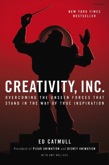
Â
Creativity, Inc.: Overcoming the Unseen Forces That Stand in the Way of True Inspiration
Ed Catmull with Amy Wallace,
Random House, New York, 2014
Â
This is an excellent case study of creativity and collaboration at scale. Ed Catmull was one of the co-founders of Pixar. With co-author/collaborator Amy Wallace, Catmull reflects on the lessons he and his colleagues have learned over nearly three decades of superior creative work.Â
There’s a management summary of key lessons at the end of the book. For example, here’s Catmull on errors:Â
Do not fall for the illusion that by preventing errors, you won’t have errors to fix. The truth is, the cost of preventing errors is often far greater than the cost of fixing them.
Pithy, but you’ll do yourself a disservice if you skip ahead to the conclusion. The value here is in the details and the unfolding stories of challenges met and mistakes made.Â
I’ve been a fan of the movies forever and I’ve always been intrigued by the complexity hinted at in the credits. It’s easy to be dazzled by the egos of movie stars and auteur directors. The real work of any movie is hideously complex and interdependent. With the likes of Toy Story or The Incredibles, you must integrate art, science, technology, and business in a dynamic balancing act that spans months and years. This is organizational and management challenge in the extreme.Â
Catmull is a computer scientist by training who grew into an executive role in a business that makes money by creating art collaboratively. The lessons here are applicable in any organizational context. They are all the more important because the organizational and economic world is moving along paths that Pixar has already travelled. Catmull’s observations and lessons learned are a report from the future.Â
Organizations are backward focused. Accounting systems, standard operating procedures, human resource policies all look backwards. That can be appropriate in a slowly evolving world, but that is not the world we live in. That we live in a time of rapid change may be a cliche, but that does not make it less true. Catmull offers timely advice for this new world:
Whether it’s the kernel of a movie idea or a fledgling internship program, the new needs protection. Business-as-usual does not. Managers do not need to work hard to protect established ideas or ways of doing business. The system is tilted to favor the incumbent. The challenger needs support to find its footing. And protection of the new—of the future, not the past—must be a conscious effort.